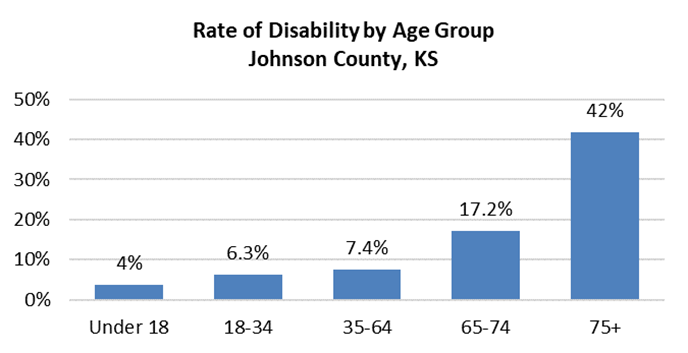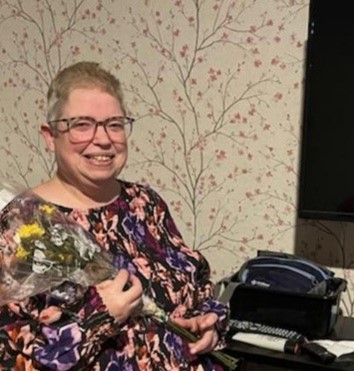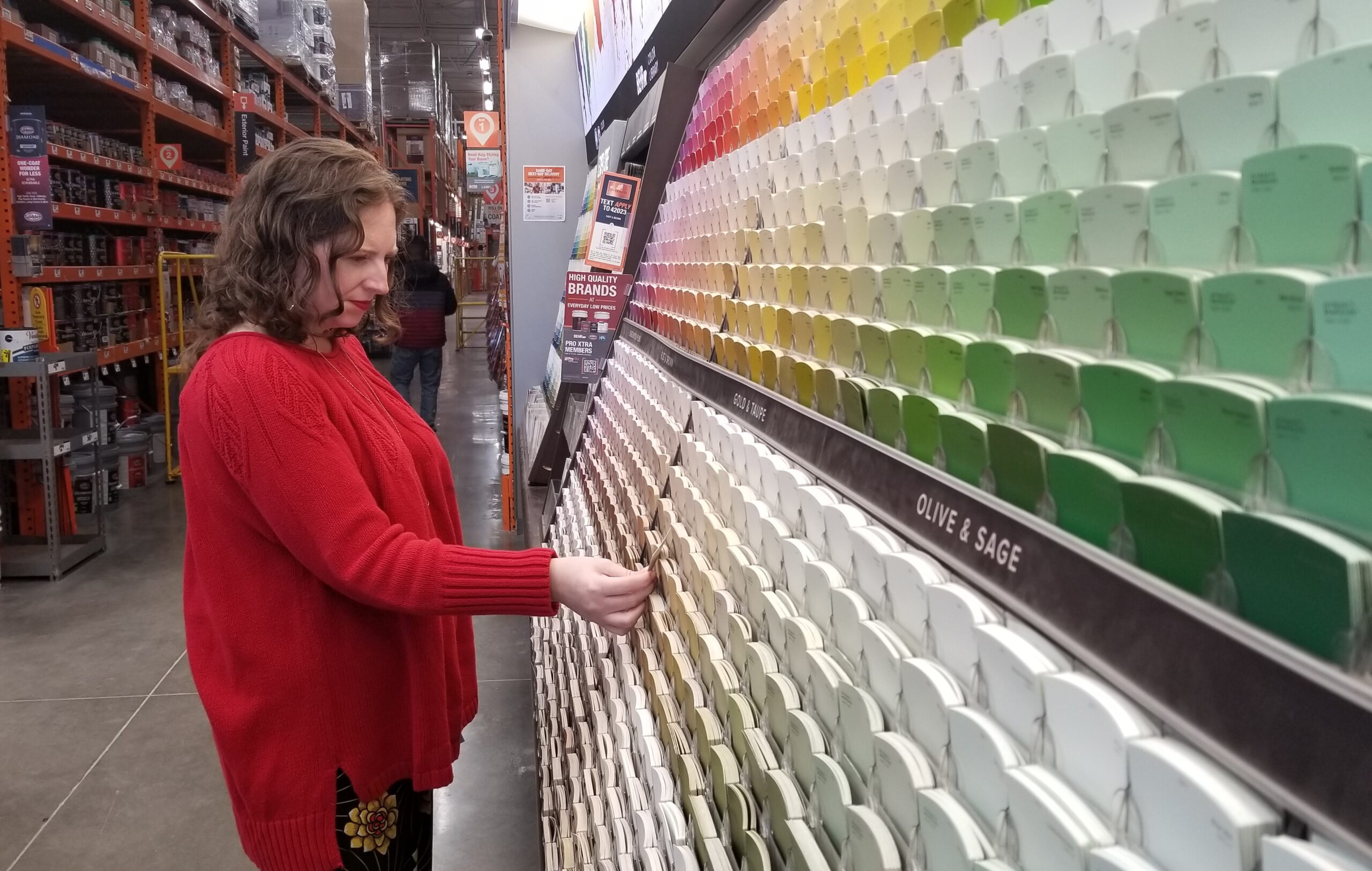Fact Sheet: A Focus on Johnson County Residents with Disabilities
People with disabilities represent an important part of the Johnson County community. According to the most recent data from the U.S. Census Bureau’s American Community Survey, more than 57,880 Johnson County residents have a disability, representing 9% of the total population. Seven percent of working-age adults aged 18-64 have a disability. Removing barriers through accommodations, assistive technology, and inclusive policies allows people with disabilities to fully participate in the community. The goal is inclusion and equal opportunity for all. Learn more from our latest fact sheet.

Safety and Wallpaper: Meeting the Housing Needs of People with IDD in Johnson County
Written by Janel Bowers, Chief Executive Officer
Friends of JCDS
For just a little bit, I would like you to think about where you live, how you came to live there, and what you thought about when finding a place to live.
What were your priorities? What was on your “have-to-have” list? What did you NOT want in your home?
Do you have those memories collected?
Great.
Now, think about what that might look like if you were a person with intellectual and developmental disabilities. And perhaps, you need a walker or a wheelchair. What does your list look like now? Is the house or apartment all on one level? What is the laundry situation – is it in the home or do you have to take your laundry somewhere? What is the bathroom like? Is there room for your mobility device to be used safely? Is the rent in your price range? What are the neighbors like? Is it close to public transportation? Big box stores? Family? Friends?
While some of these preferences are on both lists, many are very specific needs that are imperative for people who have intellectual and developmental disabilities (IDD) who live in Johnson County. And they are needs that are not easily met for all people.
They are things that Friends of JCDS, Inc. (FOJCDS) thinks a lot about. Quite possibly it could be our favorite obsession. FOJCDS specializes in creating affordable and accessible housing for people with intellectual and developmental disabilities living in Johnson County. For the last 34 years we have worked in concert with Johnson County Developmental Supports (JCDS) to provide affordable and accessible housing options to individuals who receive their residential services from JCDS. These are houses scattered about Johnson County, tucked into neighborhoods just like yours, and have helped enhance communities to be wonderfully diverse.
Why do we do this?
People with intellectual and developmental disabilities have a poverty of access. Most egregiously (in our mind) is their access to housing. The average income of a person who lives in one of our homes is $1,176.30 per month, which equates to $6.79/hour. Conversely, the 2022 hourly wage necessary to rent a modest two-bedroom apartment is $19.81.
Most landlords require proof of income that shows three times your cost of rental unit. The U.S. Department of Housing and Urban Development (HUD) says that the market rate for a two-bedroom apartment in our community is just a little over $1,250/month. An individual’s share is $625/month.
If a person’s average income is $1,176/month and rent is $625/month, that doesn’t meet the common standard for approval that most landlords have. Plus, there are always additional fees and deposits, such as a first month’s rent deposit, which are very difficult to manage on a limited income.
So, a person with IDD isn’t going to qualify and would have limited income to afford the deposits and fees plus the rent.
We haven’t even discussed the need for accessibility. There are simply not enough accessible rental units to meet the needs of all of Johnson County.
Obviously, there is the math about why we do what we do. But there is also just the stories about why we do.
Recently I was fortunate to attend an event hosted by the Knights of Columbus with one of our tenants, Kelly. I asked Kelly why she liked living in one of our homes. And I assure you, Kelly will tell me if she doesn’t.
She immediately said, “I’m safe.”
I honestly was not expecting that response, so I asked her what she meant.
“Have you seen the news? The place I used to live? Some teenager was just shot.”
I never thought of that aspect. I don’t generally think of Johnson County as an unsafe place. But I also never thought of people being shot at a parade either.
Kelly then went on to say “And I hear you let people wallpaper their room…”

Kelly and her freshly wallpapered wall.
Yep, we are wallpapering her room with paper she has chosen. So, while I think it’s affordability and accessibility, Kelly thinks about being safe and having a home that has her personality included.
No matter the reason, FOJCDS is committed to creating affordable, in-community, accessible, and apparently, wallpapered housing that people with IDD can call home.
‘I Never Thought I Would Be Homeless’: Poor Health Derails School Psychologist
Written by Mike Sherry, OnPoint Communications
An undergraduate diploma from the University of Kansas. Advanced degrees from a Washington, D.C., university. School psychologist in the Kansas City, Kansas, and Olathe school districts.
Even Lindsay Livingston, 41, is surprised that someone with her background would ever have to couch surf, sleep in her car, or nap in the study room of the public library.
“I never thought I would ever be homeless,” she said. “I never thought I’d have to work so hard to get housing that I can afford. I have worked just as hard trying to get housing as I did in my graduate school programs, if not a little harder.”
Livingston knows that a fire, a job loss, or an unexpected pregnancy are just a few of the surprises that can tip someone into homelessness. For her, it was health issues.
Always fragile, even as a child, Livingston battled through hearing problems until her lip-reading skills failed her in the large classes at KU.
She got her first hearing aids at 19, learned sign language to fulfill her undergraduate foreign language requirements, and did her graduate work at Gallaudet University, which serves students who are deaf or hard of hearing.
But the real medical problems hit when Livingston was a few years into her education career when doctors diagnosed her with Ehlers-Danlos syndrome, a disorder of the body’s connective tissue that can cause joints to dislocate even when simply writing or walking. Livingston had headaches and could not be upright for more than four hours at a time.
Livingston had continued working part-time even after spinal surgery in 2013 and brain surgery a few years later. Along the way, doctors also diagnosed her with spina bifida and Lyme disease.
Applying for Social Security disability benefits and looking for affordable housing in Johnson County ultimately became her full-time job by the fall of 2017, when she found herself sharing a room with six other single women in a Topeka homeless shelter. Her rent-free, basement accommodations had ended when the couple she was living with decided to downsize.
An itinerant year began after Livingston moved back to Johnson County after about six months in Topeka away from her support system.
Social Security approved her disability benefits in 2019.
For the past few years, she has lived in a federally subsidized apartment in Shawnee that has bed bugs. The roof of the building leaks so badly that heavy rain creates a waterfall that blocks one of the building’s first-floor entrances.
That situation is coming to an end soon since Livingston secured an apartment in a new complex in Gardner after receiving a housing voucher through Johnson County. The unit has a washer and dryer, a dishwasher, her first-ever garage, a bathtub, extra room to store her medical equipment, and best of all, Livingston said, no bed bugs or mold.
Between doctor’s appointments and time to rest, Livingston is working to improve homelessness services in Johnson County.

Lindsay Livingston, 41, of Shawnee, Kansas, looks for just the right shade of paint for the living room of the brand-new apartment in Gardner, Kansas.
Having applied separately to 15 different apartment complexes, Livingston would like the county to follow other jurisdictions in implementing a centralized system where one application gets sent out to various providers.
“There’s a huge barrier between busy work paperwork and getting housing,” she said.
Livingston also values local government programs that help residents stay in their residences by providing home-improvement funding. She also said Johnson County needs a homeless shelter and advocated for a transitional housing option where people could live while awaiting approval of their housing benefits.
Livingston headed to Topeka out of desperation when there was no better option in Johnson County.
“There was nothing; it was like a desert,” she said. “We have a bigger population than some of these other places that have better services. We can surely get something together. Definitely.”
